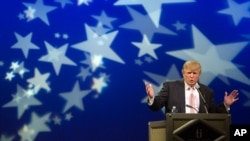At this early stage of the campaign they seem the longest of longshots: Donald Trump, Ben Carson, Carly Fiorina and Martin O’Malley. And the fact is they probably are. But that doesn’t appear to be enough to deter them from their ultimate goal—becoming president of the United States—and they are already trying to lay the groundwork.
Trump told a crowd in New Hampshire recently that he is actively considering a 2016 bid. “You know I do have a great television show. I do have a great life. I have a business that I love. But the country is going to hell.”
Neurosurgeon Ben Carson, the only African American preparing to join the race, got a huge reception at a recent conservative conference and is fast emerging as a favorite of socially conservative activists. “We live in the land of the free and the home of the brave but you cannot be free if you are not brave.”
For Republicans most concerned with foreign policy and national security, former United Nations ambassador John Bolton is casting about for support. Bolton told my colleague, VOA Senior Correspondent Andre de Nesnera, that he is actively considering a White House bid for 2016.
“I am because I think it’s absolutely critical in a dangerous world where we find ourselves today that U.S. national security be at the center of the political debate,” said Bolton. “The president has no higher responsibility than protecting the country. There are a lot of other important issues out there, the economy and so on, but if the country itself is in danger everything else is secondary. I think the people realize that and I think they want to hear this debate.”
Former Hewlett-Packard CEO Carly Fiorina, the only woman in the field of potential Republican contenders, told Fox News Sunday she would have an advantage if she ran because “I have a deep understanding of how the economy actually works, having started as a secretary and become the chief executive of the largest technology company in the world.”
More Announcements Coming Soon
In the next few weeks Republican senators Rand Paul and Marco Rubio will join Ted Cruz as official candidates. More big names are expected to follow, including Hillary Clinton and Jeb Bush. It is easy to see why Clinton and Bush get so much attention. Both are well known to American voters, can raise lots of money and have lots of supporters among party leaders. Simply say their last names and people know who you are talking about.
But that is not likely to deter a large crowd of contenders from seeking the Republican nomination in a 2016 in a race that shapes up to be the most wide open and unpredictable in decades.
Republican strategist Ford O’Connell said Jeb Bush and Wisconsin Governor Scott Walker lead public opinion polls at the moment but not by much. “Anything can happen and we are likely to see 10 or 12 potential candidates hop in this field and they are really going to have to elbow each other to get the spotlight.”
Walker in particular has been able to raise his national profile. “Scott Walker has emerged, at least for this moment, as the leading alternative for all kinds of reasons, more kind of populist and fiery and a fire-breathing conservative, but also someone who was a governor,” said Matt Dallek of the Graduate School of Political Management at George Washington University.
Clinton Challengers
Democrats are likely to have their longshots as well. That list could include independent Senator Bernie Sanders of Vermont, former Virginia senator Jim Webb and former Maryland Governor Martin O’Malley. O’Malley took a thinly veiled shot at Hillary Clinton and Jeb Bush on ABC’s “This Week” program. “I think that our country always benefits from new leadership and new perspectives. Let’s be honest here. The presidency of the United States is not some crown to be passed between two families.”
Analysts say O’Malley and several other little known contenders face a huge challenge in mounting a presidential campaign.
“It is hard if you are not a household name or at least a household name among political activists to run for president,” said Quinnipiac pollster Peter Brown. “History tells us that many of these potential candidates with a name recognition problem in much of the country won’t do very well. But there is an opportunity that involves working very hard and history says that if you are going to break in, you break through in the early primary and caucus states like Iowa and New Hampshire.”
Democrat Jimmy Carter is perhaps the best modern example of a candidate who emerged from relative obscurity to win not only his party’s nomination but the presidency in 1976. And it’s that kind of rags to riches story that still motivates longshots today, especially among Republicans, according to strategist Ford O’Connell. “It could turn into a real ‘battle royal,’ if you will and there is going to be a lot of ups and downs regardless of what the polls say today. The question is, can someone catch lightning in a bottle and then expand it to all major swaths of the party?”
It’s still early in the campaign and the odds seem long, but it appears there will be no shortage of those willing to try.
